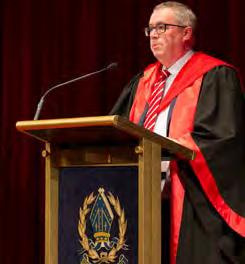
55 minute read
Welcome
Each year The Grammarian provides a snapshot of the year that was. It is an historical document. I suspect that the record of this extraordinary year will be especially valuable to future historians. None of us foresaw as we returned to school at the end of January what was in store for us. We began to hear rumours of a virus emerging in China, just as we were returning to school, and being cautious, we asked families returning from their annual trips to quarantine themselves for two weeks before returning to school.
We did not imagine then that terms such as ‘quarantine’, ‘physical distancing’ and ‘lockdown’ would become a part of our vocabulary. We did not imagine the way that this tiny virus would sweep across the world, kill over a million people globally, and change the way we live. In Victoria, we fought off a second wave of the disease by following strict lockdown rules which impacted all our lives, and which meant that we could not operate our School in our normal way. Many of the events and highlights of a ‘normal’ year at school had to be cancelled or modified extensively. We had to learn to teach and to learn through our computers, we all had to become ‘Zoom literate’, and we had to find ways to connect when we could not be together in person. The inventiveness and creativity of our staff and students was extraordinary. Undaunted by the challenge, we saw online music concerts pieced together from individual recordings. Our School Play was presented as a filmed event. Our students embraced new sports challenges on ‘Strava’, and played online Trivia for their House.
Resilience is not an attribute, it is a muscle, which gets stronger through exercise. We have all had to exercise that muscle a fair bit this year. We were given an extraordinary opportunity to learn. Our students have learned that life does not always go to plan, that we will inevitably face situations that we do not like, that we are not comfortable with, and that sometimes we will be called on to make personal sacrifices in the interests of the greater good. But the boys have also learned that they have great resources within them, which can be developed and used to sustain them through tough times. They have had to be independent learners; they have had to organise their day and maintain their motivation. And they have had to find ways to remain connected with each other and with their school.
This Grammarian is different then, from many which have preceded it. It documents a year in which many students spent significant amounts of time at home, in which sport was severely limited, in which concerts had to be abandoned, and Open Day cancelled. But it also provides a record of an historic year, in which the world fought a pandemic with various degrees of success, and in which we needed to respond to rapidly changing and unpredictable challenges. It documents the ways in which we were able to reimagine our life at school in the face of those challenges. I offer my thanks and congratulations to all who helped us get through 2020 and I know that we will be able to face whatever challenges 2021 throws at us.
As always, The Grammarian is the shared result of many people’s work. A special thank you though to Mrs Jade Dolling, who has again carried the greatest burden in putting the magazine together. From the very first article collected at the beginning of the year - from that little thing - a great magazine has grown. I am grateful for all who have nurtured its growth. Thanks also to our Prefect in charge of Publications, Matthew Chan, for all he has done to promote the writing in our school this year, and particularly through his reimagined student publication, Realms.
Dr Paul Hicks
Headmaster


2020 saw online learning from home become the ‘new normal’ for CGS students. During lockdown and isolation, students kept connected and engaged with the community by sharing snippets of shared experiences at home.
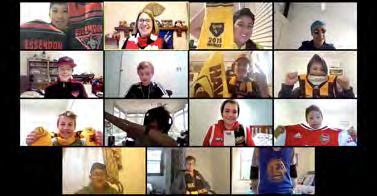
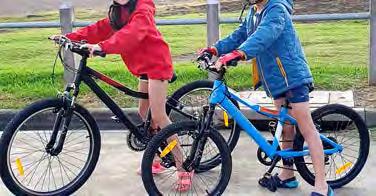


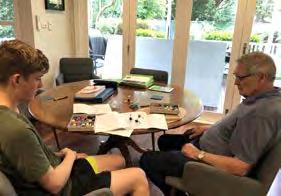
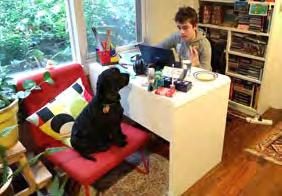






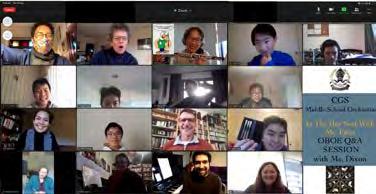








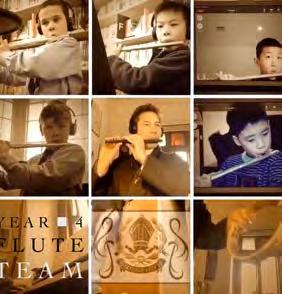

2020 seems at first to be a difficult year to write much about, much less celebrate – for many of us, the year seems to be primarily characterised by the ennui of seemingly never-ending lockdowns, by endless periods spent in front of the computer.
But it is that very notion that serves as such a strong illustration of what makes Camberwell so special: in the face of hardship, our community has nevertheless worked harder than ever to ensure that the school’s values of Learning, Respect, Integrity, Courage and Optimism continued to be upheld.
This year we have truly seen the oft-spoken edict in action: Camberwell is more than a school. It is a community.
Confined within their homes, the students and teachers of our school have nevertheless strived nobly to shine in all that they do this year. Both were presented with massive changes, and both have lived up to the task with admirable moxie.
Where it would have been easy to loiter, we have instead endeavoured to excel. When Hamer Hall was taken away, the musicians of Camberwell banded together and produced countless intricately crafted performances on video. When the Senior School Production proved unfeasible, they moved to Zoom, and gave us a show we won’t soon forget.
It is in circumstances like these that we are reminded why the annual edition of The Grammarian is such an important aspect of our school’s culture – more than ever, it stands as a testament to Camberwell’s unique and unwavering spirit. Bound within these pages are the tales of the countless students and teachers that made it happen, that refused to let the situation get the better of them.
As the year comes to a close, I would like to wish the class of 2020 all the best in their future endeavours. To those continuing or even beginning their time at Camberwell in 2021, I implore you not to squander any of the opportunities you are granted during your time at this school. This year has been an exercise in demonstrating the value that they hold.
As always, thank you to all those who made contributions to this edition of The Grammarian. And of course, special thanks must go to the people that allow this publication to be made – those in the Community and Development Office, and especially Ms Dolling – without whom this edition could not have been made.
2020 has certainly been an eventful year. I invite you to turn the page, and to experience how Camberwell embraced it.
Matthew Chan
Prefect for Publications


This year at Camberwell has been one of trials, appreciation and reflection. A polar year where we have seen the highs of community, passion and teamwork, from Term 1’s Senior School House Music and Athletics and the success of the Summer Sport Season to the lows of not seeing our mates every single day and the cancellation of all the events that encompass what Camberwell has to offer. However, through all this, the boys, faculty and the wider school community found a way to make it work.
We are immensely proud of the way in which all of the students have responded to the curveballs that have been thrown their way. There was minimal complaining and all Junior, Middle and Senior School boys were proactive in finding innovative and exciting ways to keep connected and maintain a sense of community. The House Exercise competition and Suburbs of CGS Challenge were extra incentives for everyone to stay active and get outside, while the gym coaches daily Zoom fitness sessions became a staple in many of our routines. Our passion for music was not to be stopped by the lockdowns, as we pumped out countless videos, ranging from an arrangement of Ed Sheeran’s Perfect to Shostakovich’s Praeludium. The Prefect team also took great pride in making assembly videos, including an ANZAC Day special. These were just some of the countless initiatives that were undertaken, and the willingness of everyone to involve themselves really is a testament to the spirit and resilience of all Camberwell Grammarians.
While there is no sugar-coating the disappointments of missed opportunities, the altered sleep schedules and the copious amounts of screen time, we look back on how the year has unfolded as a reminder to exercise gratitude for everything the school offers, to live in the moment as memories are made and to cherish the “happy days at school”.
Thus, as the year draws to a close, we would like to thank the students, teachers and school community for giving us the honour of serving you as the 2020 Captains. Finally, we extend our best wishes to the 2021 Prefect team as the school bounces back next year and looks forward to a much-awaited return and good times to come.
Geoffrey Gong
Captain of the School
Philip Alex
Vice Captain of the School
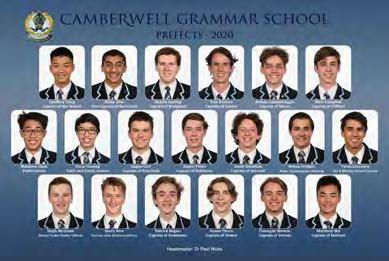


JUNIOR SCHOOL EXECUTIVE
Back Row L-R: Mr Mathew McRae, Kamran Vohra, Lucas Andreopoulos, Gary Kong, Luca Sanfilippo, Sean Verghese, Caius Kyoong, Mr Howard Kelly. Front Row L-R: Edward Goh, Felix Smith, Ashan Inpanathan, James Smallwood, Tobias Wu, Thomas Newman-Thurlby, Mr Michael Pettolino.

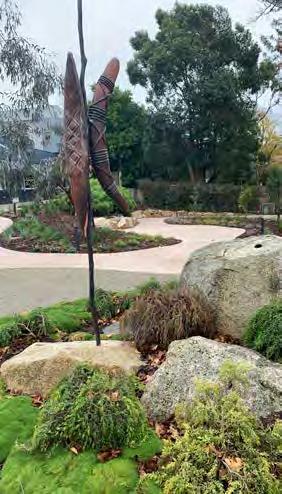
The Chapel Symbols of Fish and ‘Fishers of Men’
Our Chapel has been designed to be a quiet place of reflection and contemplation, with many Christian signs and symbols. The Apostles and early disciples first used the symbol of the fish for their logo or secret sign. In ancient Greek ‘Ichthus’ (fish) was an acrostic to refer to Jesus Christ, Son of God. Zinc tiles resembling the scales of fish cover the outside of our Chapel, the candlesticks and chalice have ‘the Nets and Fishes’ theme and the carpet is made from recycled fishing lines and net recovered from our oceans.
Sitting in our Chapel one is encouraged to feel a link with the early Christian Church and remember the words of Jesus to His Apostles and to us, “Go and make Fishers of Men”.
Parents’ Prayer Group
For some years now the Parents’ Prayer Group has gathered and prayed regularly for the boys, the staff and the whole school community. Through good times and hard times; there have been so many prayers of thanksgiving and many prayers of grief as we seek God’s comfort and healing. Especially this year, in the time of the pandemic, we prayed for our school and the whole world. We could not meet in our Chapel, but we continued to pray and gather on Zoom. Our grateful thanks go to Mrs Ros Thorn and Mrs Marti Davidson for co-ordinating our group.
The Chapel Bell
Outside the West Window of our Chapel hangs the Chapel Bell. It was once the School Bell that every day called the boys to class. A large bell is difficult to make. They usually come from Europe or Russia. Our bell was made at the Abbotsford Ironworks here in Melbourne around the time of World War II. It was made by past Grammarian Jack Tobias and benefactor of the school. In 1985 it became the Chapel Bell outside the first Chapel in ‘Tara’. Today it reminds us of our history and perhaps one day it will ring out again? Perhaps to celebrate some future great event!
Reverend Charles Butler
School Chaplain


Junior School
“Where are you?” Well it’s not the usual beginning for a Chapel service but when you are running a Chapel service alone in the Chapel with the exception of the person behind the camera, you are reminded again of the strange year 2020 has been, but it certainly hasn’t stopped us!
While the boys have been watching Chapel from their homes, they have been reminded of stories like Jesus calming the storm and Jesus never leaving us in the midst of our storms and challenging times. We have also considered how like seeds planted in the ground weeks before they spring into life, absorbing nutrients and establishing strong roots, we during isolation have learnt a lot about life, facing disappointment, building resilience and growing stronger family relationships to name just a few. These lessons are helping us become stronger and healthier for our futures; establishing deep roots of experience to draw upon.
Whilst acknowledging the challenges the boys have been facing, Chapel services and assemblies have encouraged students and staff to be like sunflowers whose faces follow the sun, looking up for strength and staying positive, including treating each other with care and kindness both in our homes and online. One of the highlights this year has been seeing the boys put kindness into action when the Junior School community together donated a very large amount of food to CAMCARE, an organisation that supports families in need within our local school area. It was so encouraging to see Junior School families caring and supporting others in a year of challenges and trials.
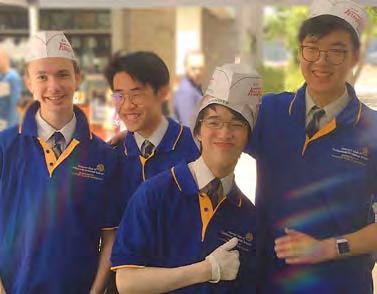

Although 2020 has certainly been a tough and rather strange year for us all, it was nevertheless wonderful to see everyone stay strong and optimistic, even throughout these unprecedented times. All the boys this year, even when studying online, displayed wonderful effort and an unbreakable attitude, in which they never gave up. Especially the Year 12s this year, there was nothing quite like returning back to school and seeing so many familiar faces.
This year, the Rotary Interact Club managed to battle throughout the pandemic, coming up with new and innovative ideas to combat the lockdown. ‘Letters Against Iso’ was a hit, collaborating with MLC to have students from all year levels come together and write letters to the elderly, filling them with support through these trying times. As well as this, we held multiple sausage sizzles across varying venues (pre-Covid), with each going down as a massive success. Through the boys’ undeniable efforts in helping others and supporting each other throughout the year, we donated various amounts to charities such as The Salvation Army, Operation Toilets and others. It was wonderful seeing so many enthusiastic students continue to expand what Rotary has to offer, and I wish those who will be involved in next year’s Rotary leadership team the best of luck in seeing just what Rotary is capable of.
Another group within CGS that I think is a wonderful opportunity for all is Mustard, a Christian group where students across all year levels have the opportunity to come together in fellowship each Thursday lunchtime. This year, we were fortunate enough to have two past Grammarians come and lead the sessions - Ian Kaharudin (2019) and Caleb Yii (2016). Even throughout lockdown, we were able to discuss and learn about the fruits of the spirit, characters in the Bible and different parables. It was great seeing the group grow throughout the year, with new faces joining despite having our meetings held over Zoom.
Finally, I wish Jack Hu, next year’s Prefect of Faith and Social Justice, all the best with his endeavours and plans, whatever awaits him in 2021.
Oscar Cheung
Prefect for Faith and Social Justice

Despite the unprecedented times and seemingly endless distractions and disruptions that occurred throughout the unpredictable year of 2020, Camberwell Grammar had another successful year in further connecting the Junior, Middle and Senior Schools.
In Term 1, particularly in Senior School, students were able to make use of the face-to-face learning to help officiate, score and interact with the Middle School boys, competing in a multitude of fun House sports competitions, such as volleyball and table tennis.
During lockdown, although it provided an obstacle, the Senior School was able to collaborate with the Junior School, making a short video letter addressed to the Junior School boys in a hope to raise their spirits and to encourage the boys to keep positive during these uncertain times, whilst giving a little insight into the fun activities the Senior School boys were up to during lockdown. I would like to thank the many students and teachers involved who participated throughout the year. It was such an encouraging sign to see everyone participate with such enthusiasm and energy despite the strenuous year it has been, and it is a true testament to the Camberwell spirit. Thank you so much to the staff of Junior School, Middle School and Senior School who were especially patient and busy this year.
Finally, congratulations to Garnett Brennan, the 2021 Junior School and Middle School Liaison. I know you will do a great job and I will be eager to see the new ideas and initiatives that you may bring to Camberwell. Good luck!
Taran Laurence
Prefect for Middle and Senior School Liaison







2020 was another successful year in the school’s Sustainability program. It began at the start of the year when we installed a new beehive in the Senior School. I was honoured and humbled to be the first Sustainability Prefect at the school, a great step forward in the school’s sustainability program.
This year we held a series of competitions such as scavenger hunts, where the students’ task was to find as many environmental facts on posters that had been placed around the school. Then COVID hit us.
At first it appeared this would disrupt the whole program indefinitely. We were unable to continue many initiatives around the school, but we found a way forward! The biggest project for the first lockdown was an assembly video. Our student environmental group Towards2050 was meeting via Zoom, which, as you could imagine, is much less preferable. However, like everything, there was a silver lining. I personally like to say that it was the greatest carbon emissions drop in the school’s history.
By the end of Term 2 we returned to school, ready to begin more events. However, as you guessed, COVID came back. Towards2050 was still meeting on Fridays. We managed to launch a few successful activities such as a sustainable cooking competition, where students were required to cook a sustainable meal that excluded things such as red meat and dairy. The prize was a jar of very locally produced honey. So locally produced in fact, it was made at our school.
I would personally like to congratulate everyone on a successful school year and am still amazed at our resilience in this unorthodox time as we work to transform the school and its approach to sustainability.
Green Thumbs!
Ms Katrina Massey and a group of students spanning the Middle and Senior Schools have been working for the past two years on developing and growing a garden on the balcony of the Middle School Atrium. They have enjoyed great success in producing seedlings from Open Day (when it is not struck down by COVID) and in producing fresh vegetables and flowers to be enjoyed by the gardening community. This program has been so successful that they have managed to expand their horizons, developing a new space next to the recent Kingussie extension. Clearly, along with literally everything in the world, this expansion has faced significant and frustrating COVID delays but we will endure and our gardens will bloom! Keep an eye out at next year’s Open Day to see the fruits of our student’s labours – they are sure to be fresh!
Meanwhile, and as Harry mentioned, our beehive has started to find its routine. The bees have plenty of scope to roam from their balcony/condominium, and the honey produced by the hive is extraordinary. We strongly recommend you take all possible steps to get your hands on a jar of CGS honey whenever you notice an opportunity. Next year we anticipate several competitions being run to provide such opportunity and look forward to sharing such nectar with the broader community. Meanwhile, we will be back next year with more opportunities to recycle waste, but in the meantime remember you can always drop off old clothes and e-waste at the collection station in the Highton carpark. And if you have any old phones clogging up a drawer somewhere in the house, bring them into the Mobile Muster station in the Senior School Library and rest assured that they will be broken down, their precious elements extracted, and your information completely destroyed in the process.
Mr Will Hone
Sustainability Coordinator
Junior School
After settling our cohorts into the new year and seeing the Year 4 and 5 boys off to their respective camps, the teachers had to make a fast transition into life in the classroom during COVID-19. Adjustments had to be made: hand sanitisers were installed in all classrooms, hand-washing, social distancing, no large gatherings, the wearing of masks and parents no longer allowed on site. As lockdown was announced at the end of Term 1, teachers had to quickly adopt new technologies and transition to digital learning platforms and the Music and Movement Centre was set up to educate children of essential workers. As many programs no longer became viable, teachers worked hard on new ways of adapting existing programs or found new ways to explore concepts. The teachers readily adapted to the new way of teaching. The Year 5 students were already familiar with Google Classroom and all the other teachers came on board. This was certainly a new way for everyone; students, teachers and parents. Moving forward to Term 3, the teachers reflected on and improved the processes experienced during the first round of lockdown and swiftly headed into lockdown 2.0. The boys quickly adjusted back into remote learning for the duration of Term 3.
Communication was all done online. The teachers upskilled to use Zoom as a way of teaching lessons to the boys and assemblies also continued virtually. Here the boys listened to Mr Kelly and Mrs Rice’s messages and everyone was able to see what was happening in the classrooms. Important messages about being a Yeti, having a growth mindset and remaining positive during such challenges were well received. The Year 5 Leadership Executive and a group of Year 12 boys sent video messages sharing ways of keeping a balance between study, exercise and keeping connected with others. Musical Soirées were adapted to give the boys opportunities to perform to a wider audience. Parent-teacher interviews were held for the first time via Zoom. Many positives came from this experience and it was lovely to see overseas parents being able to attend these conferences.
Social emotional wellbeing was vital as distance learning ensued. The boys were encouraged to continue mindfulness practices such as Smiling Mind and Mind Yeti. The Emotional Intelligence program also continued throughout 2020 and other wellbeing activities were also provided. The boys were encouraged to stay active and in Term 3 participated in a World Summit Challenge where the steps they took each day were tallied and contributed to climbing a designated mountain. The final day of Term 3 saw the classes enjoy Friday Fun Day. The Pre-Preps enjoyed a Wacky Wednesday during that week and Prep to Year 2 enjoyed dressing up and participating in a range of games and activities centred around themes such as Bugs and Lego. Years 3 to 5 had a Spring theme where they could select the activities they wished to do on the day. The boys thoroughly enjoyed all the activities and it was a memorable fun day.
The introduction of our new School communication portal DEEDS also saw the teachers attending professional development sessions led by the IT staff. This was another major change and once again the teachers rose to the challenge.
The classroom teachers continued with the journey of enhancing the teaching of writing. In Terms 3 and 4, the teachers embarked on a series of professional development sessions looking at the six traits of writing. This program links well with our existing program Seven Steps to Writing. It is pleasing to see so many budding authors in the Junior School.
Remote learning emphasised the importance of home-school partnerships. Teachers were very aware of the pressure parents were facing and were grateful for the support during this challenging time. Although we have seen the challenges, our students, teachers and parents have become more resourceful and resilient through the process and we have all learnt how quickly we can adjust to change. Until we have a vaccine, we are ready!

Mrs Caroline Gatley
Deputy Head of Curriculum


Middle School
The Middle School curriculum continues to evolve in response to student interests, current educational research, and changes in the wider world, with a view to providing our students with the skills they need to face the intellectual, social and personal challenges they will encounter in their coming years at school and into their future.
There is an increasing focus in the Middle School on skills such as creativity and design, collaboration, critical thinking and communication. This year we introduced a new subject into Year 6 – Creative Design Solutions. This subject provides a scaffolded set of activities designed to build these very skills. On a broader level, activities in every subject, across every year level, are also being reimagined to give students more freedom to create their own pathways to understanding, working with each other to share, test and modify their ideas, to reach solutions to problems that Embedded in PSD – and throughout our curriculum and our daily interactions with our students – are the school’s values. They are a bedrock for discussions around behaviour, interactions with peers and teachers, and appropriate responses to the situations and changes they are likely to experience at school and throughout their lives. This dedicated time in our curriculum allows our boys to settle into each stage of their schooling and negotiate changes in their lives in a more informed and supportive way.

Middle School teachers – Form Teachers, in particular – provide our students with amazing support. This was particularly evident this year when we transitioned to an extended period of online learning. Students and teachers alike responded to this challenge with courage and optimism, working together to support each other and to continue to learn and grow, and work through difficulties as they arose.
I would like to acknowledge the crucial role that parents play in their son’s schooling. We appreciate their support. Having their sons learning from home for a considerable part of the year provided some new challenges. The ups and downs, the successes and misses, were a reminder that learning often involves taking chances and making mistakes – but if we continue to keep our goals in mind and work together, we will get there in the end!
We have a great team, and every member of our School community should be proud of our achievements this year.
relate to problems relevant to their world. We are currently in the process of reviewing the Year 7 curriculum with the aim to continue this thread as a timetabled part of the curriculum in the next couple of years.
Personal and Social Development (PSD) is a key part of our curriculum. This subject provides the opportunity for Form Teachers to meet with their class to discuss and research ideas, and practise new skills relating to their lives in and after school. Topics range from digital literacy to gender equity, from emotional literacy to study and revision skills.
Mr Scott Wyatt
Deputy Head of Middle School


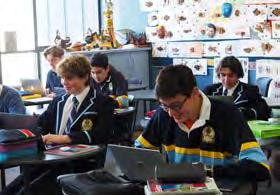

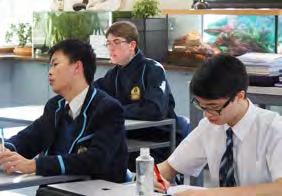
Senior School
At the beginning of 2020, our Year 12 students faced the year with optimism and with the aim of continuing the success of past Year 12s. Who could have predicted the extraordinary challenges that were to confront them as they set out to achieve their goals?
These challenges, although great for senior students, also impacted the learning of all students, no matter what their year level. The many restrictions imposed on us as a result of the pandemic created both difficulties and opportunities.
Both students and teachers had to adapt rapidly to the digital environment once directives from the Department of Education were put in place. For students, this meant that they had to take more responsibility for their own learning, and use their time at home efficiently. For teachers, learning activities had to be redesigned to be more appropriate to the digital environment.
Communication with parents about their son’s learning through parent-teacher interviews posed yet another challenge, but once we had organised the interviews to be conducted over Zoom, we found that the interviews were not only as effective, but also convenient for both parents and teachers.
Likewise, our annual Curriculum Information Nights for Years 8 and 10 students and their parents could not proceed as usual. Instead, Heads of Department prepared recordings of presentations which were made accessible to parents and students online. This mode of delivery gave parents the opportunity to view the information at a time suitable to their family, and to re-watch at a later date if necessary. We will survey parents early next year to ascertain the extent to which we may retain some aspects of these digital interviews and presentations.
As well as the obvious work done with students, it was considered important to continue the curriculum changes discussed and developed during 2019. One of these changes was the implementation of the expansion to our Learning Behaviours statement, articulating the importance of being well organised, staying focused on task, using technology efficiently for learning, asking for feedback about the quality of one’s work and acting on that feedback, collaborating when the opportunity arises and communicating openly about what is being learned. These skills are as important, if not more, when learning in a digital environment as they are when learning face to face.
Another change implemented this year is the change from Year 10 students selecting seven subjects to study in Year 11, to selecting six subjects. The benefit of this change is to allow Year 11 students to concentrate on subjects that they think they are most likely to study in Year 12, when they will study five subjects. It also provides enhanced opportunities for Units 3/4 studies to be undertaken in Year 11.
2020 has certainly shown us the resilience of our students and teachers, their willingness and ability to adapt to constantly changing circumstances, to adopt and accept new ways of working, and most importantly, to maintain contact and communication with one another. We look forward to building on all the learnings from this year, whilst focusing on the allimportant teacher-student relationships developed through face-to-face teaching.
Mr Laurie Ince
Director of Teaching
Chinese
2020 was the ‘Year of Rat’ on the Chinese calendar. According to Chinese astrology, the year 2020 is quite challenging. We paid a visit to one of our three sister schools in China at the end of 2019 and established some new relationships with the best schools in China, such as Jack Ma’s school in Hangzhou. We had to cancel many exchange programs with our sister schools in China as well as many excursions, but we stayed in touch with our sister schools throughout 2020.
This year, our teachers moved to online teaching and encouraged students to use Education Perfect programs to enhance their learning. They also participated in online professional training sessions and made a smooth transition from Schoology to DEEDS. Some of our students also took part in various online competitions organised by the Chinese Language Teachers Association of Victoria.
Mr Andrew Beale has decided to retire and I would like to thank him for his contribution and wish him all the best.
Mr Wei Ha
Head of Chinese
Commerce
The Commerce Department normally thrives on the dynamic nature of our subject material. Although this year is no exception, I would not begin to suggest that we have thrived on the negative consequences of the pandemic. Economics, Legal Studies and Accounting have all been reflected in amended budgets and spending, changing laws surrounding our lockdowns and business plans needing innovative thinking to ensure survival. This year has provided us with enough content (and debt) for a generation and I hope the most valuable lesson we learn is to be grateful for the little things in life. The Commerce Department usually engages in a very wide range of excursions with visits to markets, prisons, courts, parliaments and businesses. However this year we have maintained some connection with the outside world. Year 9s engaged in watching some live streaming of Parliamentary debates and although we were unable to visit prison this year, we have all experienced what living in isolation with restricted freedom is like. It has not been lost on me that the Zoom classes of dozens of thumbnail images reflect security camera vision from Barwon Prison cells. While we have missed many of our normal learning experiences, I think the most important lesson we have learnt is how efficient and engaging face-to-face education is and how much we value interaction with our students. Here’s to 2021.
Mr Andrew Warne Head of Commerce
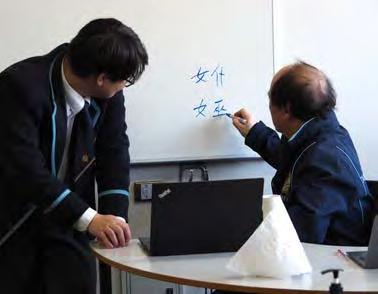
E-Learning
Charles Dickens’ memorable opening to A Tale of Two Cities, “it was the best of times, it was the worst of times”, seems an apt characterisation of almost every aspect of 2020. It was a year that tested our ability to provide students with a sense of continuity in their learning, as well as maintain a sense of connection to the school, which is such an important source of their sense of community. It was a year that tested the resourcefulness and resilience of the teaching staff as many learned to navigate new software and new styles of lesson delivery while battling their own and their students’ Zoom fatigue.
But, in the midst of the “worst of times”, came innovation, resilience and adaptation as teachers used Hapara and Zoom to deliver online assessments, encouraged their classes to ‘flip the classroom’ and lead the investigation of the topics under consideration. Behind this lay the skills that staff and students have been acquiring through the use of Schoology, soon to be superseded by DEEDS.
2020 has brought us a sense of digital resilience that is an important aspect of negotiating the world of learning and work in the 21st century and it has given us the tools that will continue to be a part of the way learning is envisioned and developed from now into the future.
Mr Matthew Wood Head of E-Learning
English
2020 has long been associated with visual acuity, or 2020 hindsight the elusive clarity of vision not possible in the hurly burly of the present. The 2020 year will certainly be remembered for changing the way we see the world. The restrictions and changes caused by COVID-19 will not diminish the wonderful student achievements and invaluable staff contributions made throughout the year – sometimes at school, and at other times, remotely. Flexibility and innovation were required to manage the changing landscape of teaching and learning. Never before had technology been utilised across the board to deliver learning opportunities as necessitated by being in lockdown. Zoom, Hapara, Google Drive, G-Suite and the like becoming new weapons in the teaching armoury. Students, too, were challenged by the demands of not only learning remotely but receiving information via two learning management systems - Schoology and DEEDS. Whilst there were challenges and difficulties, there have been innovations in education that will now be incorporated into best teaching practice.
Even in these unusual circumstances, some aspects of the curriculum were maintained albeit in different ways. Mr Peter Robinson has long coordinated the Year 8 Inter-Form Debating Competition. This year, undeterred by working remotely, he established a vigorous online competition as well as coordinating the school’s involvement in the DAV Competition for the Middle School. Also worthy of special mention is the work of Ms Aneta Renieris in bringing new life to creative writing across the Middle and Senior Schools. Her enthusiasm and bubbly personality inspiring a range of budding writers to dip their quill, with some extraordinary results. The time and effort to reimagine Realms of Gold as The Realms was rewarded handsomely by the high quality and breadth of the responses from many students across the Middle and Senior Schools. Haotian Huang and Matthew Chan edited the composition and led the Awards Ceremony with aplomb. Congratulations to Rhys Campbell for being the inaugural winner of the competition with his composition titled If He Were Here.
Full credit under trying circumstances to the conscientious application of the VCE students throughout the year. Interruptions to the year made studying more difficult, especially when courses were modified, and assessment dates were changed. Congratulations to the award winners in the Unit 3 and 4 studies. In English, they were Tom Bowers, Matthew Chan, Daniel Duong, Jamie Garnham, Geoffrey Gong, James Thorn and Sean Liu. In English Language the award recipients were Tory Crosgrove and Ryan Tam. In Literature, both the highly sought-after Mervyn Britten Award and the equally prestigious Shirley Thomas William Goodwin Prize for Literature was awarded to Rhys Campbell – a truly stellar performance. To encourage such high achievement in not only these students but in all students in the subject areas, the coordinators must be applauded. Ms Penny Wood in English, Mr James Victor in English Language and Mr John Allen in Literature have once again worked tirelessly to ensure the best learning outcomes were available to all students. Many thanks to all the other teachers of English, especially Ms Kathryn Smith, Mr Vincenzo Piscioneri, Mr Matthew Aram and Ms Miranda McDonald for their coordinating roles. It will always be a challenging subject to teach, but also one that is richly rewarding.
Mr Rick Mason Head of English
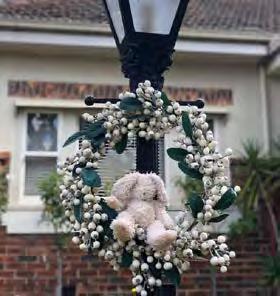
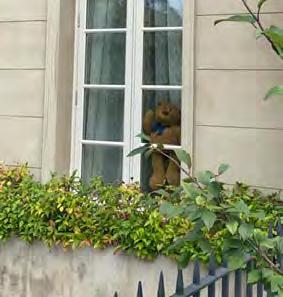
English as an Additional Language
In 2020 Camberwell Grammar School ran EAL classes for Years 9 to 12 students, with the Year 9 and 10 composite class being taught by Mr Victor. Mr Daniel taught the Year 11 and 12 classes. As in previous years, Years 9 and 10 students used the Headway Course. The Year 11 class consisted of eight students who were in a composite class with a group of mainstream Year 11 English students. The texts they studied included The Story of Tom Brennan, Maestro, Twelve Angry Men, and To Kill a Mockingbird.
The Year 12 cohort consisted of four students. Students completed regular listening comprehension practice tasks, usually based on material from the ABC Radio National website, as well as practice examination tasks. They read Christine Piper’s Australian novel After Darkness for the single text analysis. For the comparative study, students studied Arthur Miller’s play The Crucible, and Rosalie Ham’s novel The Dressmaker.
Mr Daniel once again presented professional development seminars to Years 11 and 12 EAL teachers at the Victorian Association of Teachers of English ‘Englishes Day’ online to educators in Australia, China and Ukraine teaching VCE EAL remotely to students in China. At the time of writing, Mr Victor has commenced a research project into EAL and English teachers’ perspectives on teaching grammar for a Master of Philosophy (Education) Degree.
The main challenge this year was undoubtedly teaching and learning in an online environment, and EAL students are to be commended for the way in which they continued to develop their language proficiency without the usual interactions in English that a school environment facilitates.
Mr Michael Daniel
Head of English as an Additional Language
French
We can all agree that 2020 imposed new challenges on students, families and teachers, however new and exciting ways of teaching French were discovered along the way.
Every year, one of the highlights is the excursion to the Alliance Française French Film Festival. This year was no exception as the school screenings took place before schools were locked down. Thus, in March, Year 10 students of French were able to attend a wonderful film called Fourmi before the festival was cancelled. Unfortunately for parents and friends the annual social event organised by the parents of CGS French Connection did not come to fruition due to the lockdown. Fingers crossed for next year.
As for our Camberwell GrammarLyon reciprocal exchange, it has been postponed until 2021 and we are now waiting with bated breath to see if this is possible.
This year we have been focusing on conversational fluency, which has continued with great success during lockdown thanks to the talents of our French Assistant, Madame Layton, who works with the students in small groups and one-on-one. This initiative will resume in 2021 with the help of our other French staff, Ms Phanjoo and Mr Hall, who continue to develop the AIM program in Year 7 with Mr Byrne.
On another positive note, this year has opened doors to several opportunities for language learning. For example, extension courses for French can now be undertaken by interstate providers and there seems to be more flexibility, as long as there is reliable WiFi, of course. Breakout rooms, collaboration, using the chat function, screen sharing and live feedback have made some elements of teaching more efficient and language-learning specific sites are de rigueur. The future of language learning will now more easily include both classroom and online.
Ms Naomi Eckersley
Head of French

Geography
2020 has presented many challenges and has, for awhile there, altered the way in which we interact with one another, where we work and learn and even how we socialise. Changes to the way we deliver and receive content has required a lot of hard work and countless hours of rewriting and developing new curriculum. I would like to acknowledge the hard work that all the Geography staff has undertaken in ensuring the transition to a remote setting was possible with minimal interruption to student learning. I would like to especially thank three staff members. Firstly, Mr Ian March, who during Term 1 was Acting Head of Geography, as I took my long service leave. In my absence he seamlessly transitioned the department to a remote setting, ensuring all the assessment tasks, curriculum and online accessibility was up and ready to go. Secondly, I would like to thank Mr Andreas Panousieris who taught my classes during Term 1. A favourite teacher among the students, he adapted to Camberwell Grammar School life and remote learning exceptionally well. And last but not least, I would like to acknowledge Ms Katrina Massey and the work she has done over many years creating, implementing and continually improving the Geography curriculum in the Middle School. With change comes opportunity and I am pleased to announce that Mr Michael Daniel will begin teaching Geography from 2021, joining Ms Jennifer Turnnidge, Mr Ian March and myself in the Senior years. As we move to a new learning management system, DEEDS, next year, some changes to the curriculum will follow, with new fieldwork opportunities being delivered in both Years 9 and 10, a unique and key skill in the study of Geography which will develop the skills necessary should they choose to continue Geography into VCE.
Mr Tim Cross
Head of Geography
History
The COVID-19 pandemic, Xi Xinping, Vladimir Putin and Donald Trump. Nothing has dominated global threats, fears, hopes and headlines more than these four. It is impossible to understand and assess their importance in our lives, present and future, without understanding where they all came from. Hence, the vital importance of History.
The Year 12 History course, with its focus on the Russian and Chinese Revolutions, remained popular this year, with 28 students divided into two classes. VCE Global Politics also continued to provoke heated debate among its students over such immediate issues as globalisation, transnational terrorism, the emergence of China as a superpower and the US Alliance, not to mention North Korea and the continuing antics of the US President. Two History classes in Year 11 have enjoyed the Units 1 and 2 TwentiethCentury History course, which focuses on the tumultuous years from 1900 to 2000 that included such momentous events as two World Wars, the rise and fall of Nazism and Communism and the Cold War.
The History courses in Years 9 and 10 continue to be favourably received by CGS students. These courses are important in educating responsible Australian citizens, focusing, as they do, on such topics as the impact of European settlement on Indigenous Australians; key global movements and forces (for example, imperialism, capitalism and nationalism) that have shaped the modern world; the Holocaust during World War 2; and the issues of refugees and asylum-seekers.
With the long periods of isolation this year, the History staff needed to become adept at conducting lessons online. Their diligence and creativity in utilising ZOOM for lectures, resources and group activities, as well as ramping up their use of Schoology, ensured that our students received quality delivery and attention and were not disadvantaged in their learning.
My thanks go to all staff in the department for their enthusiasm in instilling a love of History in the boys.

Dr Graham Morey-Nase
Head of History
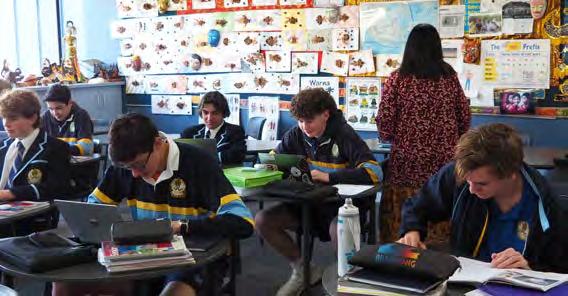
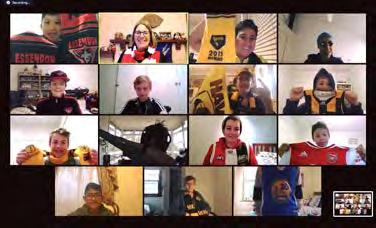
Indonesian
What an unusual year this has been with all the restrictions and limitations placed upon us with the advent of COVID-19. Unfortunately, the students studying Indonesian missed out on all the wonderful excursions that were planned. These included the Indonesian Film Festival, CERES and Zoo excursion as well as our Indonesian lunch on Indonesian Independence Day. This was only a slight setback and we look forward to resuming all these activities again in 2021.
Although online classes had their challenges for both teachers and our students, we were still able to use various techniques such as quizzes, trivia and bingo to make lessons enjoyable, and students were still able to engage in effective learning. We had to teach differently and find innovative ways of assessing students. It was interesting teaching and learning outside the box and certainly, everyone’s IT skills improved significantly. Students certainly rose to the occasion of working online and were successful in meeting their language outcomes.
Did you know that 700 languages are spoken over the 17,000 islands that comprise the nation of Indonesia, and that Indonesian people communicate using the official language of Bahasa Indonesian? Indonesia has a rich cultural heritage and learning the language is like building a bridge to access other local languages as well as the cultural diversities of more than 300 ethnic groups. The languages of both Indonesian and Malaysian are derived from the root of language, Malayo-Polynesian, so once students learn Indonesian, they will also understand Malaysian in no time. Hopefully travel will open up next year sooner rather than later and, with only a basic level of Indonesian, students can incorporate travel into the learning experience and explore the many religions, people and cultures of this vast archipelago of some of the friendliest, fun-loving and hospitable people.
The Indonesian department looks forward to 2021 and continuing to offer a language program that is enriching, accessible and challenging for all students.
Ms Janet Sharman Head of Indonesian
Latin
2020 has proved to be a particularly disappointing year, for a truly spectacular Latin Tour planned for the September holiday break had to be cancelled. Twenty-four students in Years 9 and 10, led by Dr Tuckfield and Mr Gough, were to have touched down in Valencia, Spain. From there they would follow in the footsteps of the great Carthaginian general Hannibal Barca, whose epic march on Rome is still considered one of the most astonishing feats of generalship in military history. Hannibal’s route would have taken the Latin Tour from Spain to Switzerland, then over the French Alps and down through Tuscany to Cannae. Here the boys would have walked the famed site of Rome’s greatest-ever battlefield disaster. From there, it would have been on to conquer Rome itself (the ultimate coup that Hannibal himself never quite managed to pull off), to gaze upon the wonders of the Colosseum, the Pantheon, and so many more of the
fantastic remnants of the ancient world that have delighted and inspired our CGS Latin tourists for decades.
But it was not to be, of course. As the COVID-19 outbreak spread, Italy, sadly, become one of the hardest-hit countries. Friends and professional contacts there conveyed to us the tragedy of the situation, as the hospitality industry tanked, lockdown restrictions bit deep, and the death toll mounted. Our hearts go out to them.
On a happier note, we welcome a new member to our department in 2021: Ms Kassandra Arvanitis, who will replace Dr David Bird at the Year 7 and 8 level. For many years Dr Bird has been much loved by his students for his erudition and his wit. We will miss him dearly as a colleague in the department, and wish him all the best, as we welcome Ms Arvanitis warmly.
Dr Tebb Kusserow
Head of Latin
Learning Enhancement
A truncated school year still resulted in some valuable enrichment undertakings online this year.
In 2020 we were delighted to welcome Mr Shaun Burke and Ms Rose Winford to the Learning Enhancement team. And what a year it proved to be! Teachers, Learning Assistants and students excelled in their ability to master new systems and programs in a very short time frame. Although some of our plans for the year were put on hold, the transition to online learning was relatively smooth. I am very grateful to the teachers who provided additional learning opportunities to the boys, beyond our regular programs, and to the Learning Assistants, Ms Tighe, Ms Winford and Ms Hendry, who also mastered the art of Zoom lessons and returned to school early to work with students who were permitted to attend. During our extended period of lockdown, the team kept themselves busy with professional learning, including further learning about autism, dyslexia, numeracy teaching and the role of data analysis in education.
Fifteen Year 9 and 10 students participated in the Cancer Aware Masterclasses hosted by medical students from various universities. The five-week course covered a range of diagnostic and procedural issues related to the latest research on cancer.
Eight teams participated in the Evatt Cup mock United Nations Security Council competition. Four teams progressed to the Victorian semi-finals with our Year 9 team of Alan Tian and Cooper Carbone making it to the Grand Final and representing Victoria at the National competition. This is an exceptionally good result for a Year 9 team in a hotly contested competition involving hundreds of teams from Years 9 to 12. In addition, Akalanka Gunawardana and Jerry Ji represented the school at the Rotary International Model United Nations competition which took place over three days in December.
Two Year 7 teams participated in this year’s online competition based around finding a rare mineral and role-playing the significance of the discovery for the future of a threatened species of beetle involving ethical and moral dilemmas. Our team of Ross Armstrong, Ethan Tran, Ethan Lau, Kensei Soegijono, Kye Yoshimura and Alex Zhang gained ‘Honours’ for their online presentation. Each student played their role in isolation and then the formal presentation was put together to form the whole. Congratulations to this team and also to the team of Lachlan Courmadias, Ari Canale, Christopher Khong, Justin Kwan, Marcus Lu, Aidan Poon and Joah Quach who also performed well.
A big thank you for all the high-class submissions submitted for the
Enrichment Challenges during the home learning phase which presented daily extension tasks over the course of four weeks. After careful deliberation of all submissions, congratulations went to Nathan Bosman and his team for his most neat and correct work over all of the weeks the competition ran. Honourable mentions to Justin Kwan, Alan Zou, Jim Zhu and William Georges.
It is hoped that the many other Enrichment activities curtailed this year will be able to recommence in 2021.
Mr Paul Double
Head of Enrichment
Ms Ciara Chaomhanach
Head of Learning Enhancement
Mathematics and Information Technology
During 2020, many of the traditional activities that Mathematics students engage in were either cancelled or severely curtailed. A select group of students were able to sit the Australian Mathematics Competition online at the end of Term 2. These students, Lachlan Lee, Ethan Lau, Ethan Tran, Joel Cheok and Flynn Helmer all received Distinction or High Distinction results on the test.
Our Mathematics classes were delivered online while students and teachers were in lockdown. This required teachers to come up with innovative ways to present their material. Some elected to replicate the classroom, whiteboard and all, at home while others opted for a fully digital experience and converted notes and materials for presentation online.
Teachers and students quickly adjusted and we were able to deliver our courses with only minor modifications. Tests and quizzes were conducted successfully online in a variety of formats.
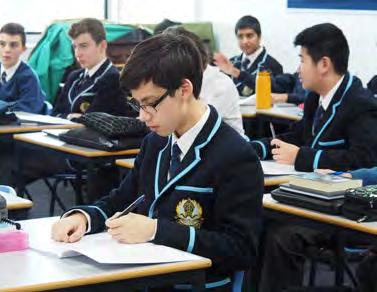
In 2021, we anticipate being able to offer the usual full range of activities including games days, competitions and invitational events.
In 2020, the Information Technology department under Mr Andrew Worsnop, formally joined the Mathematics department. Information Technology continues to grow within the school with 80 more students taking IT subjects in 2020 than in 2019. A near-record 24 students took VET Cisco Networking this year. For 2020 and beyond, the Year 9 and 10 subjects have been redesigned around four content areas of web development, game development, electronics and artificial intelligence.
We welcomed several new staff in 2020: Ms Courtney Neville and Ms Sherin George (both in Mathematics), and Ms Maddi Voumard in Information Technology.
Like the rest of the state, the Murdoch Centre for Educational Research and Innovation has had to change its method of operation in these unprecedented times. Conferences and seminars, those mainstays of the educational world, have either been cancelled or gone online. Some providers have gone out of business. The educational ‘chatter’ has been dominated by the virus, and teachers’ reactions to this, and how the professional can spring into the next phase of learning.
One early challenge the Centre faced was to advise the school on the best way to teach. Much work had already been done on online learning, but this all pointed to the clear message that online learning was not the same as face-to-face learning; it was a completely different animal, and switching to online was not a matter of replicating resources on a website. Further, by examining the research into student motivation, it became apparent that online learning was for most students a poor substitute for faceto-face learning - and the community’s experience in 2020 has reinforced this finding. The Centre came up with a model of online teaching that allowed teachers and students autonomy while still providing the regularity and rigour that was needed in students’ lives. This was reviewed as we progressed, especially from the first to the second wave, and the school community responded mightily.
While this was happening, we have also been getting ready for the new normal, especially in planning the upskilling of staff. Technological solutions to education are always tempting, but research is strong: teacher’s knowledge, passion and skills are by far the most important factors, and it is these we need to enhance. All being well, we will focus on feeding the best research into building the skills in the classroom of our teaching staff - once we have recuperated from 2020!
Dr David Rodgers
Head of Mathematics
Dr John Tuckfield
Director of The Murdoch Centre for Educational Research and Innovation

Physical Education
What a year it has been for staff and students who have shown great resilience and flexibility. It is ironic that a practical subject such as Physical Education was delivered and studied remotely via Zoom for the majority of the year!
All department members have worked cohesively to provide students in Years 7 to 12 with meaningful and engaging activities. Team-orientated sports such as AFL, soccer and hockey were substituted with individual pursuits of juggling, dance and mastering a motor skill of choice. Students also enjoyed participating in fitness sessions using resources such as Sworkit, YouTube and various fitness apps to provide variety and an opportunity to move. Weekly physical challenges set by staff further engaged students, reiterating our message to the school community that health and wellbeing is a priority

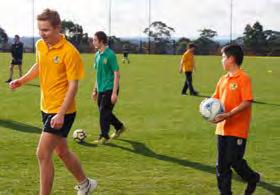

for everyone. This has been particularly important during the COVID-19 restrictions placed on all Victorians.
Our VCE Units 1-4 had to be agile with their learning too, with practical learning components removed from the study design that required new assessments and unit outlines to be developed. I would like to thank Mr Watson, Mr Miriklis, Mr Sofoulis and Mr Conlan who did a wonderful job managing this. The other theory-based subject within the department, Year 10 Sports Science, had to undergo similar changes and work around the constraints of online learning.
The department had the pleasure of welcoming Mr Nick Appleyard from the Junior School this year along with two enthusiastic AFL trainees. Miss Taylah Leslie and Mr Mitchell Quinn assisted teachers to deliver practical classes to a high standard and we are pleased to see they will both be remaining with us next year!
I would like to thank the IT department for the online platforms and training they provided staff so that they could deliver a rich and rewarding course under extremely challenging circumstances. Without them, we would not have been able to experience the level of student engagement and success we have achieved.
Lastly, a big thank you to the entire Physical Education department for their hard work and effort in an unprecedented year. We all look forward to returning to team sports in 2021 so that students can continue to develop their teamwork skills and enjoy the camaraderie of playing with their peers.
Mr David Beardsley
Head of Physical Education
Science
A Back to the Future meme travelled the internet this year with an image of scientist Doc explaining to teen Marty McFly the procedures about using the DeLorean time machine. The caption read “Rule number 1: Never set it to 2020!”.
Little did we know that this would be such a crazy and challenging year that demanded us to be creative to present our classes in such unusual ways. Zoom became an invaluable tool for teachers as they connected with students. While it was not as effective as face-to-face teaching, we persevered to try to replicate our classroom learning spaces.
This year, science students had an opportunity to engage and be motivated with their learning in a way unusual to them. This motivation served to continue to develop and refine their scientific thinking. Our lessons and teaching aim to make science real and our expectations and assessments make science rigorous.
Students’ daily experiences are fertile ground for helping them observe and understand the world around them. Students’ “funds of knowledge” (i.e. the information and experiences they bring with them to school) can be tapped to encourage and engage them in the concepts they need to know. Our assessments tap into the reality of the students and increase the possibility that they will be successful in science. A young student’s lived experience is an important consideration for teachers as they seek to explain those scientific ideas that are age appropriate. What is relevant to a young six year-old about forces and motion can be different for a 17 year-old with a more developed understanding of Newton’s laws.
Our teachers take advantage of the inherent inquisitiveness of students and incorporate those questions that students will see as natural extensions of the ideas they are already developing about the natural world.
It may take a while to decipher the longterm outcome of replacing our usual routines with a year of remote learning, but somehow one hopes that this generation will appreciate the value of school events and being with their mates. Absence probably does make the heart grow fonder.
VCE Science students are ambitious with a plan on how to achieve their goals. These final years are demanding and students thrive in an academic environment with academically focused peers. When last year’s science results showed very pleasing 33% of our students achieving ATAR scores above 40%, it is a result of many years of lessons, assignments, conversations and experiments with fellow students that have prepared them to perform at their highest standard.
Mr Gordon Wilson
Head of Science

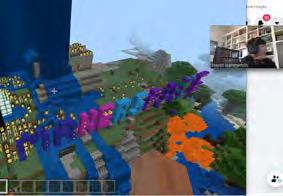
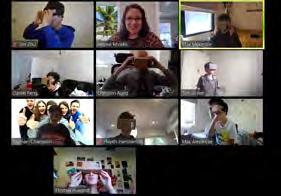
The Weickhardt Library
The start of any year is always exciting, however with the retirement of Mrs Catherine Casey and the addition of a new Head of Library, 2020 was always going to be an interesting year. As the poet says “the best laid plans of mice and men gan aft a-gley”, our plans really did go off the rails!
The Weickhardt Library, however has taken the opportunity to enhance the library experience and develop aspects of the collection. From the time that the first lockdown was declared the Library staff were on the hunt to find ways to connect with our avid readers, Makerspace group and the wider CGS community. The expansion of the eBook and eAudiobook collections enabled our students to enjoy a wide range of stories to provoke their imaginations and take them to other worlds. We used this platform to celebrate Roald Dahl Day, encouraging students to excite their imaginations. Following the lead of the Norge Library, the Weickhardt Library started a ‘click and collect’ service which saw a high turnover of physical books being borrowed and returned via the underground carpark. Mrs Pietralla continued to recommend great reads to students via Zoom reading classes, continually expanding and developing the fiction collection for both Middle and Senior School students.
The Makerspace group moved to Zoom sessions, with Mrs Miriklis engaging the boys with construction and problemsolving activities; creating Google cardboard VR goggles, building bridges with nothing more than spaghetti and blu-tak and aspiring to create schools of the future using Minecraft.
The Library has been enhanced with the addition of two large televisions which advertise upcoming events, mindfulness activities and of course memes for entertainment. The boys have enjoyed the featured themed displays, guiding them to reading material which they may not have considered in the past. We have also taken the opportunity to launch new competitions, including the incredibly successful Meme competition. Congratulations to winners William Allsop and Connor Inston, and runner up Kevin Chan.
While the school has been in lockdown the Library staff have continued to ensure materials to assist student in work were accessible and easy to find using the new DEEDS platform, which has become a one stop shop for all library needs.
Throughout the lockdowns the Library has remained open for students who needed to be at school and a special thanks to Mrs Sarah Emerson, Mrs Jan Everett, Mrs Regi Miriklis and Mrs Janine Pietralla for helping to supervise students and keeping the library open in such extraordinary times.










